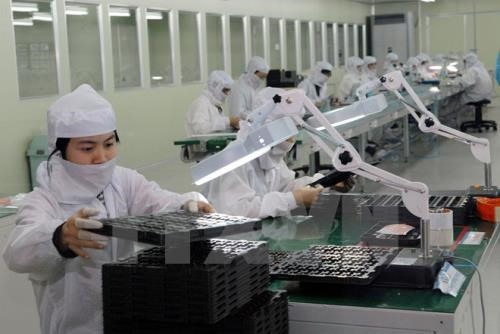 Economy
Economy

Vietnamese businesses’ spending on environmental protection remains modest compared with their total investment and operation expenses, according to a survey released on Wednesday.
 |
| Vietnamese companies’ spending on green technologies to protect environment is modest. — VNA/VNS Photo |
HÀ NỘI – Vietnamese businesses’ spending on environmental protection remains modest compared with their total investment and operation expenses, according to a survey released on Wednesday.
The survey, conducted by the National Centre for Socio-Economic Information and Forecast under the Ministry of Planning and Investment, looks into domestic enterprises’ investment in updating environmentally-friendly technologies.
Trần Thị Hồng Minh from the centre said the survey covered 357 enterprises in the northern provinces of Bắc Ninh, Thái Nguyên and Quảng Ninh, which were home to a large number of industrial parks. Most of the surveyed firms operate in the processing and manufacturing industries, which require significant spending on production and waste treatment technologies to avoid pollution.
Data showed that nearly 40 per cent of the companies invested in environmental protection and regularly spent money on this activity. However, up to 74 per cent of these firms spent less than 10 per cent of their initial investment expenditure on environmental protection, Minh said.
It also found that State-owned enterprises had the highest investment in environment protection, accounting for 76 per cent. Non-government firms accounted for 26.5 per cent, while that of foreign direct invested companies was 55.5 per cent.
On average, businesses’ regular spending on environmental protection accounted for just over one per cent of their total operation expenses. Close to 70 per cent of the firms said they had updated their technology once since their establishment, with 30 per cent of those using technology imported from China.
Meanwhile, only 22 per cent of the respondents said they had switched to using environmentally friendly technologies. The ratio of companies investing in technological updates was even lower in the metal work industry, despite the fact that this is an industry that poses a high risk of environmental pollution, according to the survey.
The survey also noted that existing policies supporting technology updates were still inconsistent, overlapping and impractical. Only a few companies had received assistance, not to mention the irksome administrative procedures.
Nguyễn Ngọc Anh from Nam Anh Company suggested that the Government should review the current policies to help businesses get easier access o funds and supporting programmes. This could help them renew technologies to protect the environment.
“The Government is calling for environment protection, waste water and trash treatment. However, businesses have found it hard to invest into friendly environmental technologies due to high costs. We expect more realistic policies to be able to invest into new technologies,” he said.
Lương Văn Khôi, deputy director of the National Centre for Socio-Economic Information and Forecast, said the survey aimed at assessing favourable conditions and difficulties facing enterprises in updating technology and environmental protection, thereby suggesting feasible solutions for them.
The centre suggested establishing a green bank to provide credits for technology renewal. It proposed to connect credit institutions and businesses in the activities while promoting the role of environment protection funds. — VNS




